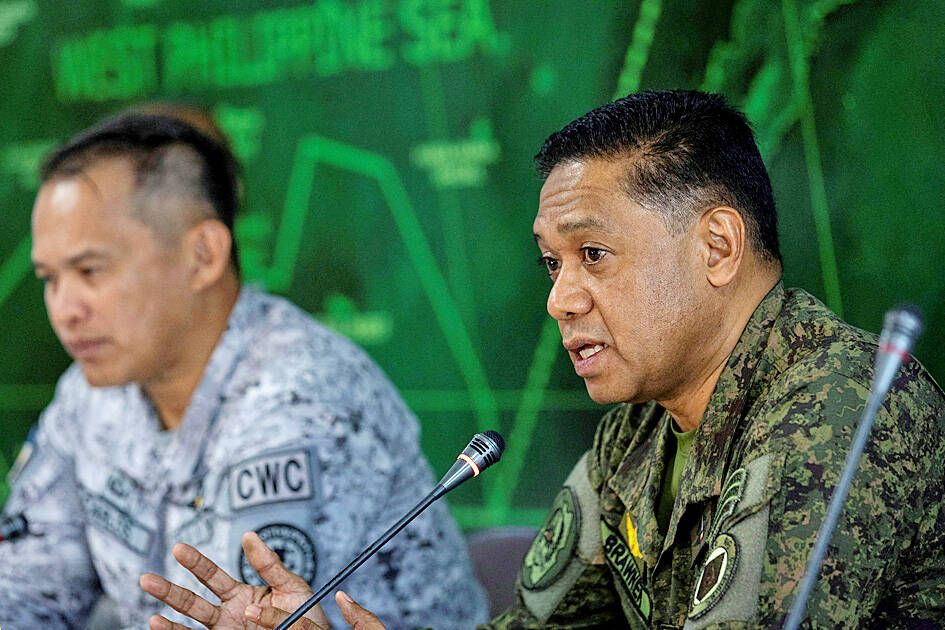The Philippines is to upgrade outposts in waters off its coast and acquire more ships, its military chief said yesterday, as the nation seeks to push back against China’s growing assertiveness in the disputed South China Sea.
Manila and Beijing have a long history of maritime territorial disputes in the waterway, but relations have sharply deteriorated over a series of incidents involving vessels from both nations.
Armed Forces of the Philippines Chief of Staff General Romeo Brawner said the nation would develop “the islands and other features” it held.

Photo: Reuters
The Philippines has outposts on nine reefs and islands in the Spratly Islands (Nansha Islands, 南沙群島) in the South China Sea.
Brawner said Thitu Island (Jhongye Island, 中業島) would be among those where facilities would be improved with the installation of desalination machines and communications equipment.
“We are just trying to make it more liveable, more habitable for our soldiers because they really have poor living conditions,” he told reporters.
However, the plan does not include “fortifying the Sierra Madre,” Brawner said, referring to a crumbling World War II-vintage ship grounded on Second Thomas Shoal (Renai Shoal, 仁愛暗沙) by the Philippine Navy in 1999 to assert the nation’s territorial claims.
The Philippines would also acquire “more ships, more aircraft, radars,” Brawner said, as part of a modest modernization program that began more than a decade ago.
Beijing claims almost the entire South China Sea and has ignored an international tribunal ruling that its assertions have no legal basis. China this month held military drills in the South China Sea as the US and the Philippines conducted their own joint exercises in the same waters.
The Philippine Congress has earmarked 800 million pesos (US$14.3 million) for the transportation department to build a port facility on Nanshan Island (馬歡島) where boats, including those for fishing, could seek shelter.
Another 1.5 billion pesos has been allocated for the expansion of the airstrip on Thitu Island, Philippine House of Representatives Appropriations Committee Vice Chair Luis Campos said on Sunday.

DAREDEVIL: Honnold said it had always been a dream of his to climb Taipei 101, while a Netflix producer said the skyscraper was ‘a real icon of this country’ US climber Alex Honnold yesterday took on Taiwan’s tallest building, becoming the first person to scale Taipei 101 without a rope, harness or safety net. Hundreds of spectators gathered at the base of the 101-story skyscraper to watch Honnold, 40, embark on his daredevil feat, which was also broadcast live on Netflix. Dressed in a red T-shirt and yellow custom-made climbing shoes, Honnold swiftly moved up the southeast face of the glass and steel building. At one point, he stepped onto a platform midway up to wave down at fans and onlookers who were taking photos. People watching from inside

A Vietnamese migrant worker yesterday won NT$12 million (US$379,627) on a Lunar New Year scratch card in Kaohsiung as part of Taiwan Lottery Co’s (台灣彩券) “NT$12 Million Grand Fortune” (1200萬大吉利) game. The man was the first top-prize winner of the new game launched on Jan. 6 to mark the Lunar New Year. Three Vietnamese migrant workers visited a Taiwan Lottery shop on Xinyue Street in Kaohsiung’s Gangshan District (崗山), a store representative said. The player bought multiple tickets and, after winning nothing, held the final lottery ticket in one hand and rubbed the store’s statue of the Maitreya Buddha’s belly with the other,

‘NATO-PLUS’: ‘Our strategic partners in the Indo-Pacific are facing increasing aggression by the Chinese Communist Party,’ US Representative Rob Wittman said The US House of Representatives on Monday released its version of the Consolidated Appropriations Act, which includes US$1.15 billion to support security cooperation with Taiwan. The omnibus act, covering US$1.2 trillion of spending, allocates US$1 billion for the Taiwan Security Cooperation Initiative, as well as US$150 million for the replacement of defense articles and reimbursement of defense services provided to Taiwan. The fund allocations were based on the US National Defense Authorization Act for fiscal 2026 that was passed by the US Congress last month and authorized up to US$1 billion to the US Defense Security Cooperation Agency in support of the

‘COMMITTED TO DETERRENCE’: Washington would stand by its allies, but it can only help as much as countries help themselves, Raymond Greene said The US is committed to deterrence in the first island chain, but it should not bear the burden alone, as “freedom is not free,” American Institute in Taiwan Director Raymond Greene said in a speech at the Institute for National Defense and Security Research’s “Strengthening Resilience: Defense as the Engine of Development” seminar in Taipei yesterday. In the speech, titled “Investing Together and a Secure and Prosperous Future,” Greene highlighted the contributions of US President Donald Trump’s administration to Taiwan’s defense efforts, including the establishment of supply chains for drones and autonomous systems, offers of security assistance and the expansion of